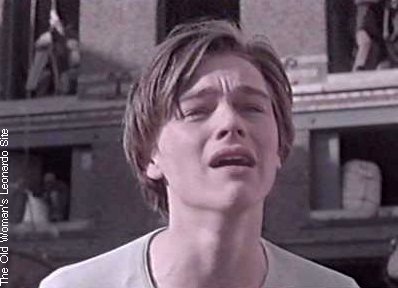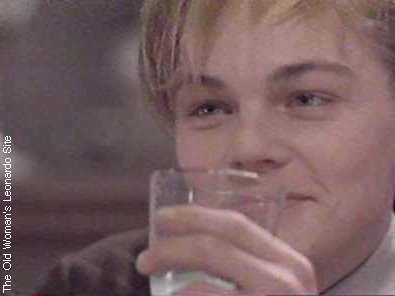 Total Eclipse
Total Eclipse
In this 1995 film directed by Agniezka Holland is a dark portrayal of the 19th century French poet, Arthur Rimbaud, a prodigy who, between the ages of 16 and 19, turned the poetic world on its ear with his raw, non-lyric work and forever changed the face of French poetry. His work, a century later, inspired the likes of Jim Morrison and "the rock generation". Rimbaud is portrayed effectively by Leonardo DiCaprio, who is joined in the film by David Thewlis as Paul Verlaine.
The Plot: Paul Verlaine, a somewhat successful poet married to a wealthy woman, invites to his home a young poet named Arthur Rimbaud. Verlaine states that Rimbaud's work is remarkable for a man of 21 years of age, and is astounded when he discovers that Rimbaud is actually only 16 years old. Rimbaud, however, doesn't fit well in Verlaine's artistocratic home. He is uncultured, crude, flea-ridden and decidedly assertive and self-assured. Luring Verlaine to him with his writing ability and his blatant sensuality, Rimbaud eventually convinces Verlaine to leave his wife and newborn child. The two travel and work together over a period of three years, during which the two of them produce their finest artistic achievements. Their time together isn't entirely blissful, however.
Rimbaud seems to be plagued with a bipolar personality: sometimes childlike, playful and sensual; sometimes arrogant, aggressive and violent. In a test of Verlaine's passion for him, Rimbaud stabs Verlaine in the hand with a knife. Rimbaud also has premonitions of a trek across the desert and his own death. The young genius both frightens and intrigues Verlaine.
For his part, Verlaine is a weak man, who is often conflicted about wanting the "safety" of his life with his wife and family, and his appreciation of and physical desire for Rimbaud. Given the choice by Rimbaud between Rimbaud's body or his soul, Verlaine is embarrassed by his own admission that he wants Rimbaud's body... When, after two years together, Rimbaud threatens to leave him, Verlaine drinks himself into a dither and accidentally shoots Rimbaud in the hand. The assault puts Verlaine in prison for two years, and leaves Rimbaud to return to his home in the country (where he finishes his masterpiece)...
They meet again, only briefly, after Verlaine is released from prison, then go their separate ways: Rimbaud to Africa (where he is afflicted with fever and a tumor in his leg), and Verlaine to Paris. After Rimbaud's death, Verlaine is sought out by Rimbaud's sister who wants Verlaine to return to her the manuscripts her brother had left with Verlaine. Knowing that Rimbaud's family will destroy much of the work (deeming it too suggestive and lurid for public consumption), Verlaine refuses the sister's request and keeps Rimbaud's work intact for future readers and poets to appreciate.
The film ends with Verlaine in a bar, drinking a toast to his by-then-dead one-time companion, Rimbaud. Rimbaud appears to him as a youthful spirit, who asks Verlaine if he loves him, and then kisses his hand goodbye.
Our Review: This is a dark film, but strangely entrancing -- mostly because of DiCaprio's performance. His Rimbaud deftly waxes between the pure and the profound; the innocent and the provocative; the beautiful and the horrible. A tall order for a young actor, yet, he pulls it off expertly. His Rimbaud is an excellent match for David Thewlis's besotted Verlaine; if DiCaprio were a lesser actor, the scenes in which Rimbaud effectively controls Verlaine wouldn't have been believable.
The only thing we didn't like about this film was that it seemed to "end" about three times. The last sequence (of an older Rimbaud in Africa) could have been done without entirely. Rimbaud's trek through the desert and his death could have been summed up by either Verlaine (who was doing commentary throughout the whole film anyway) or Rimbaud's sister. The final vision of Rimbaud's spirit, as a teenager again, running down the beach with the "white wings" banner was also a nonessential element. We understand that the director was going for an "artistic" rendering of Rimbaud's death, but it was heavy-handed, anticlimactic, and distracting. It would have been far more interesting if we could have heard some of Rimbaud's poetry on the subject, or seen, perhaps, Verlaine's artistic response to his friend/lover's demise.
[[The montage above/left contains the following images from the film: (top to bottom) Rimbaud arrives with his fleas at Verlaine's home; Rimbaud tells Verlaine that "love" has to be redefined; Rimbaud seduces Verlaine; Verlaine watches Rimbaud sleep just before they take off on their summer jaunt; Rimbaud declares he's leaving Verlaine; Rimbaud is shot by Verlaine; Rimbaud is operated on without anesthesia; Rimbaud, half child/ half genius, seeing the world differently than others;Rimbaud's spirit kisses Verlaine's hand.]]
A WARNING TO VIEWERS: The openly homosexual themes and full frontal nudity in this film may offend some viewers.
OTHER'S REVIEWS:
From Mr. Showbiz on the web: "'I followed him--I had to,' says the bearded, ruined Paul Verlaine (David Thewlis), of his connection to the younger, more talented nineteenth-century poet Arthur Rimbaud (Leonardo DiCaprio). Total Eclipse is directed by Agnieszka Holland (Europa, Europa) and adapted by Christopher Hampton (Dangerous Liaisons) from one of his early plays. Like all of Holland's films, it is a thoughtful, layered narrative with powerful undercurrents. It is also a very difficult film to watch, unsparing in its documentation of the potent cruelty that binds the two men together in a curious sexual and emotional complicity....
Perhaps more damaging is the fact that neither protagonist inspires much sympathy. As Verlaine, Thewlis is a snaggle-toothed, spoiled, self-indulgent coward. He hurls his pregnant wife to the floor, sets her hair on fire, greedily bites the hand that feeds him (it belongs to his rich, perplexed father-in-law), all the while falling under the spell of the fierce Rimbaud. DiCaprio fares better as the feral, beautiful boy who has 'decided to be a genius.' Rimbaud retains a clarity of vision even when the two are fast in the grip of their fevered obsession. Miserable and penniless in a filthy London room, Rimbaud recognizes that he is 'the minion of a bald, ugly, aging lyric poet who clings to me because his wife won't take him back.'...
Holland's story is not about art, nor about identity. It is about passion. When that black, ugly passion is spent, nothing much remains. DiCaprio and Thewlis both give courageous performances (though in different ways)..." --Mary Brennan
A FEW MORE IMAGES FROM "TOTAL ECLIPSE"






Back to our MAIN PAGE.
DISCLAIMER: All of the written text and animated GIFs associated with this site are the sole property of TheOldWoman, unless noted otherwise, and may not be reproduced in whole or in part without Mare's permission. All of the images associated with this site are the sole property of the original filmmakers and/or photographers, unless noted otherwise, and are reproduced here under the auspices of "fair use" of copyrighted materials to accent reviews, promote the projects of Leonardo DiCaprio, and entertain his fans. No, I cannot reproduce hard copies of the images for you, so please do not ask. FYI: For those of you who have asked, most of the images created for this site were done so with the help of the SNAPPY Video Snapshot program and the GIF Construction Set program available on the net.
TO GET A COPY OF THIS VIDEO, try your local video outlets, or Blockbuster Video, Columbia House Video, or Reel Video on the web.
 Total Eclipse
Total Eclipse




